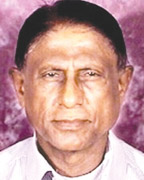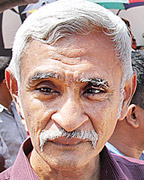Jumbo shortage hits kandy perahera
Reduced elephant population cause for concern:
By Maneshka Borham and Asela Kuruluwansha
 |
| Gamini
Jayawickrama |
 |
| Jagath
Gunawardene |
The scarcity of domesticated elephants needed for upcoming peraheras
and other religious events has become a contentious issue in recent
weeks. The ongoing tussle reached a boiling point when earlier this
week, Minister of Sustainable Development and Wildlife Gamini
Jayawickrama Perera dramatically announced that elephants which are not
released by owners for religious purposes when requested by the
government, will be confiscated through a court order. According to the
Minister, while 120 to 140 domesticated elephants are estimated as being
available for such purposes, officials from the Sri Dalada Maligawa
claim, there is still a lack of elephants for the upcoming Kandy Esala
Maha Perahera, the most venerated religious event in Sri Lanka.
Domesticated elephants
"The lack of domesticated elephants for this year's Perahera has
adversely affected the perahera," says the Diyawadana Nilame of Sri
Dalada Maligawa, Pradeep Nilanga Dela Bandara. According to him of the
132 domesticated elephants in the island, 52 cannot take part in the
procession due to various reasons, such as, illness, musth,
aggressiveness or other problems.
While 71 elephants are being prepared for the upcoming Perahera, Dela
Bandara says it is a far cry from the 105 elephants that took part in
the procession in 2005. He says, if the three most venerated Peraheras -
Kandy, Ruhuna Kataragama and Devundara - were held concurrently, each
would be left with a mere 30 elephants. "Fortunately each Perahera is
held at a different time period," he says, lamenting that if this issue
continues in the future, the Kandy Perahera will have to be held sans
the elephants that have graced the procession for hundreds of years.
Commenting on the statement made by Minister Jayawickrama Perera,
Dela Bandara says it is an issue between the Ministry and the owners of
elephants. He says, around 20 of the elephants currently in court
custody due to permit issues, were used in the Perahera last year, thus
causing a further reduction in numbers.
Expressing his views, the Basnayake Nilame of the Kataragama Devalaya
of the Sri Dalada Maligawa, Gemunu Walisundara says the government
cannot take such a 'high handed' decision. "It is not possible for some
of these elephants to take part in the procession due to various valid
reasons," he said, adding that a government elected through the mandate
of the people cannot act as an absolute monarchy by issuing such threats
to the owners of elephants. "While those who held elephants illegally
must be prosecuted, the traditions and culture of the country must be
protected," he added.
Legal position
However, the law is on the government's side and officials can
confiscate the elephants if the owners have violated the terms and
conditions of the permits they have been issued. Currently, the main
accusation levelled at elephant owners is that they are violating
conditions of the permit given to hold elephants, by using them for
purposes other than that stated in the permit, specifically tourism.
According to Lawyer and Environmentalist Jagath Gunawardene, under
Sections 17, 22 (a) and (12) of the Flora and Fauna Ordinance, the
government has the power to confiscate elephants that are misused, i.e.
other than for the said purpose, whichwould then become government
property under the Public Property Act.
"Therefore, temples must ensure that elephants donated along with
permits are only being used for religious purposes," he says, adding
that an elephant meant for a temple, was instead, taken to a popular
nature park, once. When the fact was revealed the elephant was taken
over by the government. Currently, too there are some owners using these
elephants for other purposes. "This type of abuse is not acceptable," he
says, adding that it is demeaning for the same elephant that takes part
in a religious procession held in such high esteem, to be seen taking
tourists on rides at tourist spots. "The Wildlife Department must ensure
the elephants are being used for the correct purposes under the
conditions stipulated," Gunawardene said.
Elephant owners
"This year too we are prepared to provide elephants for main
religious processions" says Secretary, Domesticated Elephant Owners'
Association, Damsiri Bandara Karunarathna . He says, the Association has
no dispute with Minister Perera. "We have no problem in providing
elephants for the peraheras as the owners do it willingly," he said.
In fact many elephant owners considers it a blessing and also fulfil
vows made to the Gods. "We will not willfully shirk this duty as we
consider it extremely inauspicious," Karunarathna says, adding that
elephants that are not taking part are either sick or face other issues.
Karunarathna does not deny that elephants are used for other purposes
during the rest of the year. "Some elephants through permits, are
allowed for tourism purposes," he says. He approves of this, but it must
be done with the welfare of the elephant at heart, and without much
discomfort for the animal. "The Elephant being a symbol of Sri Lanka
tourism, using them in the trade is necessary, but within limitations,"
he stressed.
Karunarathna says, instead of bickering with each other, all parties
should work towards a long term plan to solve the issue of the dwindling
number of domesticated elephants, while also more importantly putting in
place a program to focus on the welfare of the animals.
Solution
Minister Perera announced that a training facility for elephants
intended for the use of temples will be established to counter the issue
of the diminishing numbers. The facility will be able to train 30
elephants and will be opened in the recent future, the Minister said.
"Mahouts too will be trained at the facility to treat the animals in the
correct manner," he added.
Gunawardene supports this, as it will regulate the use of elephants
and they will be better cared for in a government facility, with the
availability of veterinary services, while also ensuring that these
elephants will be available for the breeding program.
Further, to meet the demands, the government of Sri Lanka has now
requested an elephant calf from the government of Myanmar and the
request is currently being processed. President Maithripala Sirisena
announced last month, that elephants will be brought down from Myanmar
in order to protect the Perahera culture of Sri Lanka.
According to an official of the Nature and Wildlife Conservation
Division of the Myanmar Department of Forests, the process will take
around two months due to red tape, and also the required training and
domestication of the elephant calf.
However, Basnayake Nilame Nilanga Dela says tuskers from countries
such as Myanmar and Thailand are shorter in stature. "We need tall
tuskers to bear the sacred casket and currently there are only four in
the island," he says, adding that it should be considered by the
authorities.
Even though the Elephant Owners' Association has not been informed
yet, as confirmed by the Secretary of the Association, the Minister of
Wildlife has announced that permits of owners will be renewed early this
month, rectifying a long drawn issue faced by them since 2014, when the
issue of illegal domesticated elephants first broke out.
While elephants are a symbol of Sri Lankan culture and traditions it
is undeniable that the animals taking part in such processions will
suffer some form of discomfort.
Dr. Deepani Jayantha, Country Representative of the Elemotion
Foundation and Conservationist says, "If a facility to train elephants
is established, the welfare of the animals should be paramount and
monitored at all times."
Karunarathna agrees, and says: "Mahouts must be trained to treat the
animals kindly, and strict regulations must be imposed for private
owners.
"If one requests an elephant for example, I believe it must be
refused if he does not own other elephants, in order to prevent the
animal from being overworked and misused for various purposes. "We need
a solution not only for the low numbers of domesticated elephants but
also to ensure the welfare of these animals and prevent their abuse," he
observes.
Karunarathna says, strict regulations must be put in place to ensure
that elephants given under permits must be available for a breeding
program. "It is only then that we can ensure the increase of a herd," he
says, adding that it will be a long term solution to protect the
perahera culture and mitigate the challenge posed by the dwindling
numbers of domesticated elephants in the country. |

